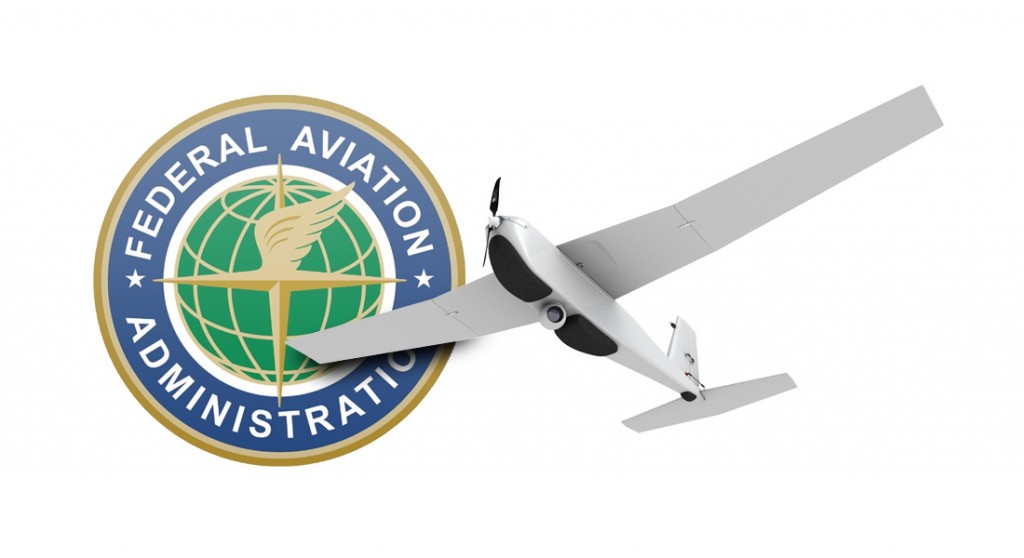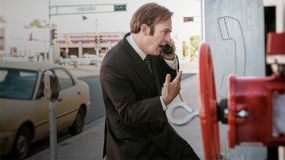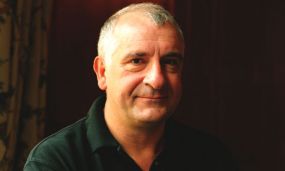
David Biggs
I try to always keep an open mind and my wits about me. Other than that, anything goes! Makes for some unpredictable adventures out there in the real world. I've worked in the publishing industry for 10+ years and have been a member of the FSWA for 5+ years. Go Steelers!
Website URL: http://www.drinkfive.com
So.. what are drones, anyway?
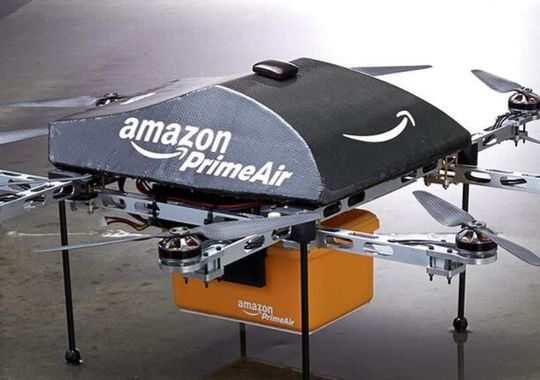
We assume that as the technology matures and different tiers of these unmanned aircraft are naturally formed, we'll also adopt more terminology to better organize the mess of products available.
When someone mentions drones in a conversation, most people immediately think of models that are being used in the military (like the MQ-1 Predator or MQ-9 Reaper) or the recently emerged plans of Amazon to use drones for super-quick package delivery. Surely this is because when we see drones in the media that is just how they are currently represented. I think it's important to shine a spotlight on the other uses for drones though, such as monitoring crops and cattle or conducting search and rescue.
Tune into the Retrospectical Podcast (Drones - What are they, who uses them and what does the future hold?)
Download the mp3
Dividing up the drones..
When talking about all of the different types of drones out there and being used right now, public awareness about many of these is lower than it should be. Likely this is because (with the exception of the military) there simply aren't very many out there just yet. Here is a quick breakdown of industries that drones are being utilized in:
- Military (reconnaissance/surveillance and weaponized).
- Weather Systems (NASA and Northrop Grumman are engaged in an experiment with drones to learn more about the formation and heartbeat of hurricanes.
- Agricultural uses include monitoring fields and cattle and even spraying and seeding remotely.
- Automated drones can be used to create 3-D maps from multiple images and don't even need to be manually controlled with the maturity of GPS technologies.
- Search and rescue gets a huge boost with this sort of technology - allowing for remotely controlled drones to get into areas otherwise impossible for human teams and utilizing night vision and heat sensing.
- Police departments and Fire departments across the world have also been making the push to secure room in their budgets for drones - there has been some push-back as far as the police uses are concerned but there are many applications that come to mind for both.
- Other industries include film-making (documentary, entertainment, sports) and, in fact, drones were used extensively just recently in the 2014 Sochi Olympics for skiing and snowboarding events.
New FAA Regulations
In 2012, Congress told the FAA to create rules for the emerging drone marketplace and after some time with no news, they finally complied earlier this year (January 12, 2015). Two categories of drones were broken out in these new regulations: 55 pounds or less, and less than 4.4 pounds. These categories were labeled "Small unmanned aerial system (UAS)" and "micro-UAS" respectively.
Download the FAA's proposed drone regulations here.
It's important to keep in mind that at this stage these are only proposed regulations rather than laws that have been passed, but most people in the industry agree that these rules were much needed. Some of the proposed regulations include: daylight-only operations, maximum speed of 100 MPH and maximum altitude of 500 feet, operators must be 17-years-old and pass a series of tests and certifications - some of which are to be readmitted after a set amount of time.
Those rules may seem understandable - even necessary - but one that a lot of drone operators are already up-in-arms about is that you may not be allowed to operate a drone out of line-of-sight. This means that the aforementioned Amazon business plan of sending out drones to deliver packages would not be allowed under these rules. Also those wanting to use drones for the agriculture industry over large amounts of land would not be able to. A debate and controversy looms here, and we'll certainly be seeing and hearing more about this in the next few years.
Where do I start as a hobbyist?
Quad-copters and other multi-rotor drones may be the best start for someone looking to get one for themselves and explore the industry as a hobbyist. They are more stable and powerful than traditional airplanes or helicopters and are generally also easier and more simplistic to repair, based on their designs.
You can buy quad-copters relatively cheaply now (the Syma X1 is only $40, for example) but those with more features like built-in cameras or video cameras, GPS, larger batteries, the ability to carry items in flight and other advanced options will cost significantly more, even up to $10,000 for the top-of-the-line models for enthusiasts.
The DJI Phantom is one of the more popular starter drones - it comes with a high-definition camera, a high altitude range and GPS functions. It's around $500 so there is definitely an initial investment but not one as insurmountable as it used to be.
Looking to the sky..
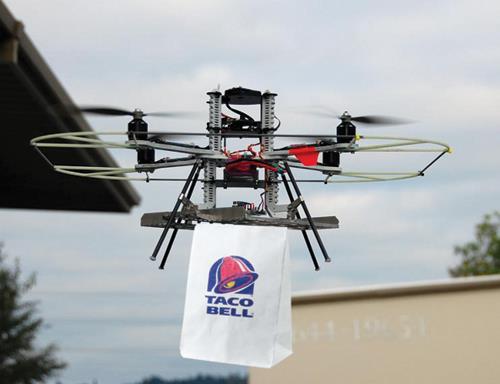 We all want taco-copters and pizza-copters (don't we? C'mon guys, get with the program!), but in order for there not to be complete chaos in the skies, the FAA regulations we talked about earlier may prevent this from happening - at least in the short term. I'm not giving up hope just yet, though, and as with any other industry there will be new developments and regulation changes in the coming years which may open up new business models for companies that are currently exploring the use of drones.
We all want taco-copters and pizza-copters (don't we? C'mon guys, get with the program!), but in order for there not to be complete chaos in the skies, the FAA regulations we talked about earlier may prevent this from happening - at least in the short term. I'm not giving up hope just yet, though, and as with any other industry there will be new developments and regulation changes in the coming years which may open up new business models for companies that are currently exploring the use of drones.
When Amazon initially brought out its now famous video introducing the possibility of drones delivering packages with only a very small (30-minute) wait after the initial order, people were skeptical (and rightly so!). But now they've already gotten to advanced drone prototypes and have applies to the FAA to begin real-world testing.
Google has numerous projects in the works.. some for delivering items (small and large) bought from the internet, but others for self-powering drones that could hover almost indefinitely in the stratosphere (Project Titan) and deliver internet access to places that either don't have it currently, or have been affected by a disaster that may have disabled it.
Increasingly, there has been a focus on the development of drones that can fly autonomously. Interesting that this development coincides with all of the projects that are currently going on with automobiles - looks like the Jetsons may actually be a reality at some point in the next 20 or 30 years. Regardless of how you feel about this industry, it will grow and mature in the coming years and bring with it innovations and ideas that were previously thought impossible. I'm just happy that I get to experience all of this as it happens.
Welcome to the TV Soup podcast, the home of drinkfive.com’s television review series. This episode continues our discussion on the Breaking Bad spin-off prequel series Better Call Saul starring Bob Odenkirk. The third episode of the season is a doozy, bringing us just a little bit closer to Saul Goodman. Be sure to check out the companion article to the third episode of the season, "Nacho."
Our plan is to review every episode of whatever series we are currently watching (unless they end up being too horrible for either of us to handle, in which case we have no problem panning the show and changing it up!) both on the podcast and also in more traditional, long-form articles. Please follow along with us as we begin our journey into Better Call Saul and thus into the mind of Jimmy McGill / Saul Goodman.
Sometimes it's nice to sit down and chat about a common interest. Jason and I hope to continue to bring you these sorts of topics that we are both passionate about and we think this episode is a good example of just that. It's truly amazing what you can learn about a person by digging a little beneath the surface, and Douglas Adams has so much more to him than just being the author of The Hitchhiker's Guide to the Galaxy (which is not to belittle that particular accomplishment, certainly).
From his involvement in Monty Python's Flying Circus, to penning episodes of Doctor Who, to going on a crusade to help save several endangered species all across the world Douglas Adams has left a deep and lasting impression in the hearts and minds of many. His footprints across literature, television, radio and science & technology in general will last for years to come.
"I love deadlines. I like the whooshing sound they make as they fly by."
Whooooooooosh. That’s how I felt when I finally got around to beginning the herculean task of digging deep into the history of Douglas Adams and his works. Obviously we can’t cover everything here, but since there are already so many biographies and profiles out there detailing the basics – why not just quickly cover the bases and dive right into the fun stuff? Why not, indeed.
 First of all, if you stumbled here by accident or ignorance and you’re not sure who Douglas Adams is, he is most well-known as the author of The Hitchhiker’s Guide to the Galaxy, a book series that grew into an empire of media and is supported by legions of die-hard fans. But we’ll get back to all of that.
First of all, if you stumbled here by accident or ignorance and you’re not sure who Douglas Adams is, he is most well-known as the author of The Hitchhiker’s Guide to the Galaxy, a book series that grew into an empire of media and is supported by legions of die-hard fans. But we’ll get back to all of that.
Tune into the drinkfive Retrospectical Podcast (Episode 02: Douglas Adams, The Life and Times of)
Born on the 11th of March, 1952 in Cambridge, England, the Adams family (just the one ‘D’, mind you) actually moved to and lived at a RSPCA (Royal Society for the Prevention of Cruelty to Animals) shelter in Brentwood, Essex shortly after his sister, Susan was born. He was about 5-years old at the time, when his parents divorced and he went with his mother and sister to live at the shelter with his grandparents. It makes sense that this time in his life may have sparked his love for animals and nature and he went on later in life to become a well-known environmentalist and wrote Last Chance to See, a novel and radio series on the BBC about witnessing species near extinction first-hand over several trips.
Back to School
Known for his humor and writing prowess at an early age, Adams went through his school years being noticed not only for excellence in creative writing (he was the only student ever awarded a 10/10 by his English teacher Frank Halford in prep school) but also because he was already a towering 6-feet tall when he was just 12-years old (he would top out at 6’5”). By all accounts he breezed through university on nearly wit alone and was able to explore quite a few avenues of his creativity – not only on the page, but also onstage as a comedian.
In addition to the adventures he surely had while staying at his grandparent's animal shelter, Douglas hitch-hiked from Cambridge to Istanbul (not Constantinople) and elsewhere around Europe in the years surrounding his education at St. John's college. Not being from a particularly affluent family, he needed some way of making money to support himself while traveling and among other short-lived professions he worked as a barn builder, a chicken-shed cleaner and a hospital porter (for those not familiar with the job, it involves running laundry, patient hygiene and other similar tasks).
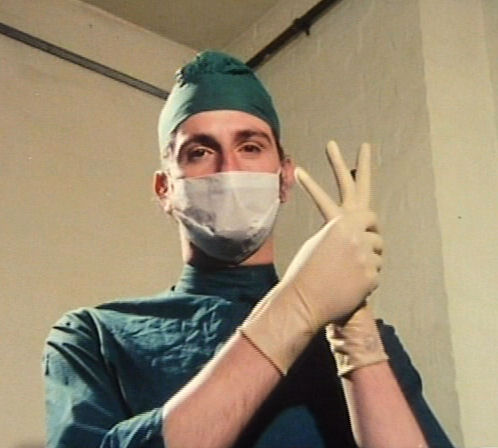 It becomes clear when looking over what has been recorded of Adams' life that he had no qualms whatsoever about taking whatever job could get him through the next few months or years between writing projects. My personal favorite was Adams' stint as a bodyguard to a Qatari family of oil tycoons while they were staying in London. According to Adams, that particular job involved "opening and shutting doors and running away if anyone turned up with a hand grenade". Yikes.
It becomes clear when looking over what has been recorded of Adams' life that he had no qualms whatsoever about taking whatever job could get him through the next few months or years between writing projects. My personal favorite was Adams' stint as a bodyguard to a Qatari family of oil tycoons while they were staying in London. According to Adams, that particular job involved "opening and shutting doors and running away if anyone turned up with a hand grenade". Yikes.
Anyway, it was a very uneven path that Adams walked after his days at St. John's and since falling in love with comedic performance (he had been involved with several during his days in Cambridge) he was bent on getting into TV and/or radio as a comedy writer. He was one of only two people outside of the original cast of Monty Python to get a writing credit (in this case for a sketch called "Patient Abuse") and later even appeared in 2 episodes (one of them being episode 42, no less!) of Monty Python's Flying Circus.
Frustration & Inspiration
Unfortunately - after enjoying some successes - Adams' opportunities slowed to a crawl. It was during this time that he tried to support himself through the mess of odd jobs mentioned above. He had a hard time dealing with this lack of interest in his work and that was reflected in his opinions of himself at the time. From Adams' The Salmon of Doubt, "I have terrible periods of lack of confidence [...] I briefly did therapy, but after a while I realized it was like a farmer complaining about the weather. You can't fix the weather - you just have to get on with it".
 So, how did The Hitchhiker’s Guide to the Galaxy get its start when it looked as though Adams was already nearing the end of what would have been a rather short career? First, let’s go back to one of those nights he spent hitchhiking around Europe (Innsbruck, Austria in this case) before heading back to his studies in Cambridge. At the time, Adams had been using a copy of Hitch-hiker’s Guide to Europe to make his way around and one night when he was “frantically depressed” in Innsbruck he stared [drunkenly] up at the stars and thought that maybe there should be a Hitchhiker’s Guide to the Galaxy because it “looked a lot more attractive out there than it did around me.”
So, how did The Hitchhiker’s Guide to the Galaxy get its start when it looked as though Adams was already nearing the end of what would have been a rather short career? First, let’s go back to one of those nights he spent hitchhiking around Europe (Innsbruck, Austria in this case) before heading back to his studies in Cambridge. At the time, Adams had been using a copy of Hitch-hiker’s Guide to Europe to make his way around and one night when he was “frantically depressed” in Innsbruck he stared [drunkenly] up at the stars and thought that maybe there should be a Hitchhiker’s Guide to the Galaxy because it “looked a lot more attractive out there than it did around me.”
It wasn't immediately, but rather when he was backed into a corner and nothing else seemed to be working out for him did Adams come back to this idea of writing a Hitchhiker’s Guide to the Galaxy. Like so many other artists before him, it seemed as though all of his worldly experiences up to that point came together in one creative surge to produce the story-line and characters in their original form. Originally, Hitchhiker’s was developed as a sci-fi comedy radio play composed of six episodes (Douglas called them Fit the First, Fit the Second, etc as an homage to The Hunting of the Snark by Lewis Carroll) and quickly became a cult favorite in spite of the lack of advertising (in fact, the first episode aired at the awkward time of 10:30pm on a Wednesday night).
There were several things about the radio series that contributed to its popularity and uniqueness among all of the other material on BBC Radio at the time:
- Peter Jones was the voice of The Book in the series; the creators were actually looking for someone with a ‘Peter Jonesy sort of voice’. When they failed in their search, they hired Peter Jones himself.
- It was the first comedy series on BBC Radio to be made in Stereo. Sound effects were among the things deemed most important for the show.
- The theme song was a cover of a song from The Eagles’ album One of These Nights, called “Journey of the Sorcerer.” It was covered several times for different releases of the program, but the whole point was that the arrangement of the song sounded futuristic while still keeping a “hitchhiking feel” because of the predominance of the banjo throughout the piece.
Moving Right Along..
With the success of the radio show, Adams was given a job at the BBC as a radio producer but he was never really interested in the position, instead wandering over to work on Doctor Who as a script editor. He later went on to pen several Doctor Who episodes including “City of Death” which is widely regarded as one of the best classic Doctor Who stories of all time. Nice work, Douglas. A few notable things from these days:
- Life, the Universe and Everything (the 3rd novel in the Hitchhiker’s series) was apparently first born into the world as a Doctor Who story, with the working title “Doctor Who and the Krikkitmen”. When the screenplay was never produced, Adams re-wrote the story with characters from Hitchhiker’s to fit that universe instead. Slartibartfast as the Doctor, Starship Bistromath as the TARDIS and the Krikkiters for the Daleks.
- A permanent part of the Doctor Who universe, the Sixth Doctor mentions him in saying that “my old friend Douglas” used to say the response to “What’s wrong with getting drunk?” is “Ask the glass of water.” Also, in the novel version of a Doctor Who story that Adams wrote called “Shada,” a character claims to have replaced a copy of The Worshipful and Ancient Law of Gallifrey with The Hitch- (and is at that point interrupted).
- When at school, Adams wrote and performed a play that he called Doctor Which.
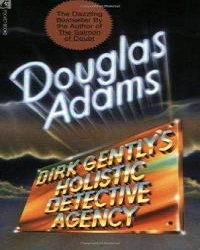 Douglas Adams eventually finished 5 novels in the Hitchhiker’s Guide series as well as two radio series (Fit the First through Fit the Twelfth) and there have been additional radio series’ and novels but they were all finished and produced after Adams passed away in 2001. So far the series has been a radio broadcast, multiple theater productions, a “trilogy” of books, a BBC TV series, a computer game, a comic book mini-series and a Hollywood movie. He also wrote two novels in a different universe with different characters, called Dirk Gently’s Holistic Detective Agency (described as “a kind of ghost-horror-detective-time-travel-romantic-comedy-epic”). These novels had some critical success but never reached the level of his most famous series.
Douglas Adams eventually finished 5 novels in the Hitchhiker’s Guide series as well as two radio series (Fit the First through Fit the Twelfth) and there have been additional radio series’ and novels but they were all finished and produced after Adams passed away in 2001. So far the series has been a radio broadcast, multiple theater productions, a “trilogy” of books, a BBC TV series, a computer game, a comic book mini-series and a Hollywood movie. He also wrote two novels in a different universe with different characters, called Dirk Gently’s Holistic Detective Agency (described as “a kind of ghost-horror-detective-time-travel-romantic-comedy-epic”). These novels had some critical success but never reached the level of his most famous series.
So Long and Thanks for All the Fish..
Other stuff you may not know about Douglas Adams:
- He was an atheist who was “convinced that there is not a god”. A friend of Richard Dawkins, he was outspoken on religion and religious topics.
- After achieving success with Hitchhiker’s, Adams was able to pursue his own projects free of financial constraints. He used this freedom to champion environmentalism, traveling across the world in order witness endangered species in their native habitats and write about them in Last Chance to See. He climbed Mt. Kilimanjaro in a rhino suit to support Save the Rhino International. Since Adams’ death, Save the Rhino has had a memorial lecture in Adams’ name to raise money featuring many notable personalities. 2015 found Neil Gaiman speaking on Immortality and Douglas Adams, for example.
- An early supporter of the Apple Macintosh, Adams was an “Apple Master”, a program that Apple ran which featured celebrities that were also users and evangelists for the Macintosh. It is said that he was the first person to buy a Macintosh in all of Europe, but some say that it was actually Stephen Fry.
- Douglas wrote a documentary film called Hyperland starring Tom Baker (of Doctor Who fame) in 1990 – it basically details how hypertext could create interconnected pathways of text, audio and video that we could explore in real-time through a network. In other words, the World Wide Web. Very much into technology and on the cusp of new ideas, Adams started a company called The Digital Village in 1994 who produced the game Starship Titanic and started H2G2.
- For his 42nd birthday, Pink Floyd guitarist David Gilmour invited Douglas to play guitar on stage with the group at a concert. Shortly afterward, Gilmour asked Adams to help the band name their latest album - he did just that which resulted in Division Bell.
Recent Articles
-
NFL Confidence Pool Picks & Strategy 2024 - Week 18
 To say this has been a year of uncertainty is an understatement. So many injuries, coaching changes, player issues shaped…in Fantasy Football / NFL
To say this has been a year of uncertainty is an understatement. So many injuries, coaching changes, player issues shaped…in Fantasy Football / NFL -
NFL Confidence Pool Picks & Strategy 2024 - Week 17
 Christmas is indeed the time of giving. And this year, the NFL is giving us a double-header on Christmas Day…in Fantasy Football / NFL
Christmas is indeed the time of giving. And this year, the NFL is giving us a double-header on Christmas Day…in Fantasy Football / NFL -
NFL Confidence Pool Picks & Strategy 2024 - Week 16
 Normally, being just a few weeks away from the end of the season, playoff positions are solidified and we need…in Fantasy Football / NFL
Normally, being just a few weeks away from the end of the season, playoff positions are solidified and we need…in Fantasy Football / NFL -
NFL Confidence Pool Picks & Strategy 2024 - Week 15
 Finally! They’re done! We are heading into week 15 and FINALLY we are done with bye weeks! 16 games a…in Fantasy Football / NFL
Finally! They’re done! We are heading into week 15 and FINALLY we are done with bye weeks! 16 games a…in Fantasy Football / NFL
 Please wait...
Please wait...- Home
- drinkfive Podcasts
- David Biggs

